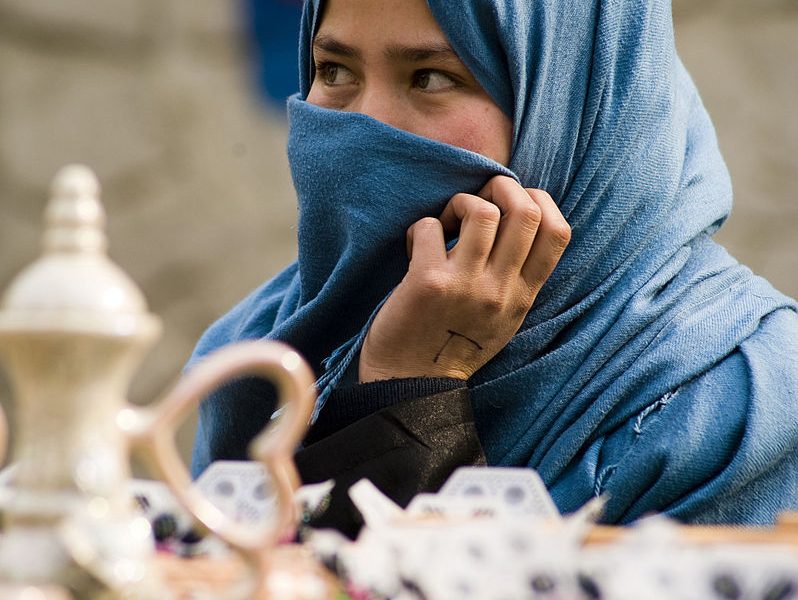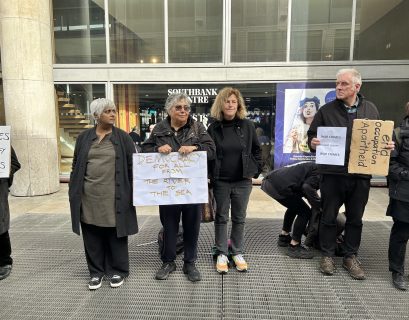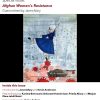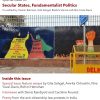FEMINIST DISSENT STANDS IN SOLIDARITY WITH AFGHAN WOMEN AND WITH ALL THOSE FIGHTING FUNDAMENTALISM
Feminist Dissent views with horror and dismay the betrayal of the people of Afghanistan and all those fighting fundamentalist movements everywhere. Before and since the August 15th 2021 takeover of the country by Taliban, we have watched news of protest marches and heard Afghan women speak out. We are in awe of their steadfast courage in the face of brute force.
Feminist Dissent sees fundamentalist movements as modern political movements of the far right which use religion to exercise authoritarian control, especially over women. The Taliban was never seen by us as simply a form of medievalist Pashtun tribalism, and certainly not as a liberation movement. The dominant views from the ‘anti-imperialist left’, Western ‘peace’ movements, Western governments and counter-terror establishments converge in ways that both stereotype and sanitise the Taliban.
The deal struck between the US and the Taliban which excluded the Afghan government, civil society and particularly women, had a horrible familiarity. While on one hand condemning Islamist groups, Britain’s security establishment has played a central role in nurturing fundamentalists, promoting ‘talking to terrorists’ and designating some of them, including death squad leaders, as ‘non-violent extremists’, fit to run sharia courts and control the lives of Muslim women in the UK.
The British Chief of Defence Staff Nick Carter’s claim that the Taliban want an ‘inclusive’ Afghanistan builds on the convenient myth that the Taliban are merely ‘tribal’, romantic men of honour who will keep order in the Badlands by controlling international jihadists so that they do not trouble Western capitals. Both US President Biden and UK Prime Minister Johnson share this view. It is a dangerous, racist, and self-serving fantasy. For the people of the region across the Afghanistan/Pakistan border, the twenty-year war that started in December 2001 is not ending but is being continued by other means.
The Taliban began as a creation of the Pakistani military establishment and could not have succeeded without its backing. The movement’s goal is the subjugation of Afghanistan, the erasure of women from public space, and the destruction of every positive aspect of Afghan culture, both traditional and modern. As Karima Bennoune, the UN Special Rapporteur on Cultural Rights, has said, “Afghan cultural rights defenders have worked tirelessly and at great risk…to reconstruct and protect this heritage, as well as to create new culture. Afghan cultures are rich, dynamic and syncretic and entirely at odds with the harsh worldview of the Taliban”.
The Taliban’s principal target has always been the Afghan people. During the shameful ‘peace talks’, women active in public life were targeted – judges,journalists and politicians faced attack and assassination. But the negotiators did not blink and pressed on with the deal, forcing the Afghan government to release 5,000 prisoners, with no assurances in return. Details of the forced surrender and betrayal of Afghans are still emerging, but it is clear that the Taliban agreed not to attack US forces, and to stop international jihadi networks from operating. In short, they agreedto become a US partner in return for rights to police the region.
Male journalists and rights activists too have not been spared. Among the most prominent was Dawa Khan Menapal, and the Indian photojournalist for Reuters, Danish Siddiqui. These targeted assassinations constitute war crimes, and are not ‘collateral damage’ as the Taliban have claimed. Alongside a public relations offensive of Taliban visits to Shia communities on Muharram, and reassurances to Hindus and Sikhs that they will be safe, there are reports of the torture and murder of the Shia minority, Hazaras, who are traditional targets of the Taliban. They are once again in danger along with other religious minorities.
Ordinary people such as those who are seen by the Taliban as traitors for having done even menial jobs in foreign embassies and companies are being hounded out and are living in fear for their lives. Taliban 2.0 (referring to the current form it has taken) has certainly changed. In line with other fundamentalist movements, it gives careful attention to its media relations and different audiences. Meanwhile, showing that it has learnt much while forgetting nothing, it has already committed new atrocities on women reminiscent of ISIS – such as forced marriages and sexual slavery. Even if Afghanistan ‘stabilises’, the result of Taliban rule will be to substitute outright war by ethnic cleansing, gender apartheid and genocide.
But it is not only Afghans who are threatened. Pakistanis living in the border areas have suffered greatly from their government’s policies of dividing ‘bad’ Taliban (that attacks the Pakistani government) from ‘good’ Taliban (that attacks Afghans across the border). Indeed, the most vocal critics of the military-mullah alliance are the Pakistanis who have experienced its impact in displacement, disappearances and terror attacks.
A decade ago, Western peace organisations failed to grasp the convergence of their analysis with the ISI and the Pakistani government, focusing purely against US drone attacks in their protests. Today, an indigenous Pashtun peace movement – PTM – draws huge crowds to demand an end to the murderous policies of the Pakistani state, accountability for the disappearances and imprisonment of activists, including elected representatives. Shut out of the mainstream media, virtually unreported in the West, and persecuted by the state, the PTM has stood firmly for non-violence and made calls for solidarity with Afghans across the border. Gulalai Ismail, a Pashtun secular feminist, has pointed to the continuities between colonial era laws and practices to control the border regions and has clearly condemned the US-Taliban Doha deal, the economy of war, and the Pakistani military state.
In India under Modi, the return to power of the Taliban in Afghanistan opens new opportunities for the Hindu right to deploy jihadi threat to promote Hindutva and to label ordinary Muslims as terrorists. But the government’s silence on the murder of Danish Siddiqui is a sign that talking tough on extremism is not backed up by action and is merely used as a cynical ploy against India’s Muslims.
Pakistan’s Afghan policy is a triumph of its theory of ‘strategic depth’ in which Afghanistan had to be captured in order for Pakistan’s tame jihadi forces like Lashkar e Tayaba and Jaish e Mohammad to concentrate on the capture of the ultimate prize which is Kashmir. This threat has to be recognised as a serious one, along with a wider policy of disruption in the region. Far from containing international jihadi networks it will enormously extend their reach and delight their followers globally.
As these examples show, it is necessary to fight every iteration of fundamentalism. Our analysis is drawn from the work of feminists and secular human rights advocates working in the region who have long and deep experiences of fighting against blasphemy laws, genocide and their connection with the oppression of women. We also draw inspiration from the many struggles for freedom fought against colonialism in the past, which established secular, multi-religious and multi-ethnic states in which women were able to emancipate themselves. For decades the descendants of these liberation struggles, principally women’s rights activists, from countries such as Algeria, Bangladesh, India, Pakistan and Sudan warned of the dangers of fundamentalism, while criticizing the failings of their own governments.
We have always been deeply opposed to the idea that a truly sovereign state can be built through foreign intervention and a world order that destroys the ability of governments to make sovereign decisions. It is now very clear that the war economy the NATO intervention has built has been one that attracted criminal enterprise, the vast bulk of which is the bonanza to the contractors of the occupiers. However we would also add that the defeat of humanitarian intervention is no cause for celebration when it has simply been replaced with an older model of indirect rule. In this case, it is the marriage of puritanical religious fundamentalism with the neo-liberal thievery of the kleptocratic state. The chief beneficiaries of this new settlement, apart from the Pakistani state, are likely to be China, Russia and Iran. As Karima Bennoune has warned that governments who think they can live with a ‘‘Pax Taliban’ have made a grave error.
To those who ask, what was the point? we say that in spite of the many difficulties for Afghans in working alongside both occupiers and insurgents, frequently ignored by one and targeted by the other, the NATO intervention created a breathing space. Refugees returned, girls and boys were educated and an entire generation developed a flourishing civil society in every area of achievement, from robotics to football, to a courageous independent media. Women played a key role in development, including polio vaccinations and in response to the COVID crisis.
However, far from ‘saving Afghan women’, much of the counter-terror responses of the NATO forces focused on deals with war lords and promoting jirgas reinforcing patriarchal institutions as stabilising forces. In contrast, women went to work, negotiated anti-violence legislation and worked in the health sector to reduce maternal mortality. These developments were supported by friendly regional governments such as India and Bangladesh, as it was never simply Westerners who were the self-styled ‘saviours’ of Afghan women. It was supremely an Afghan effort, a women’s effort to rebuild their society, in the midst of continuing war and occupation.
Millions have been spent on projects to ‘reform Islam’, embraced by Western academics who have declared secularism and universalism to be Western imperial projects. Our history tells us otherwise. The fact is that the Universal Declaration of Human Rights reflects the language and aspirations of women who opposed Nazism, racism and colonialism. In more recent times, survivors of genocide and sexual slavery advocated to recognise mass violence against women, including rape and forced pregnancy, as international crimes. The preamble to the Indian Constitution has rallied Muslim women for their right to citizenship. In Sudan, women have overthrown the regime of Bashir, a hero of the Muslim Brotherhood, wanted for genocide but not arrested until the women’s revolution. Kurdish women – without even a state to call their own – are trying to build an egalitarian society in the middle of a war, and their armed resistance helped to stop the genocide of the Yazidis. Active and successful resistance to fundamentalism is everywhere.
In the bitter times to come, we hope that the memories of their achievement and the possibility of building another Afghanistan will sustain Afghan women. We will not turn away from those who remain to continue their work, or those forced into exile. We stand with you, in Afghanistan and abroad. Your struggle is our struggle. We say to you, ‘Fear is their weapon, courage is yours.’
Calls for Action
We are deeply concerned about the plight of feminists, atheists, human rights defenders, dissident artists as well as all ordinary Afghans who oppose the rule by the Taliban or who are caught in the disastrous vortex of events in the wake of the withdrawal by the US and Western powers.
We urge charities to provide assistance with emergency housing and with legal help for settlement.
We urge social movements to think creatively about the ways in which they can continue to support Afghans, whether inside or outside Afghanistan. For those seeking refuge away from Afghanistan, sponsorships, places in educational institutions and job offers, should be put together with urgency.
We also call on the Left and feminists to think again about the meaning of our important traditions of internationalism and that these cannot simply celebrate the defeat of US-UK policies, but need to urgently face the reality of what is happening in Afghanistan, and think through the significance of this for our theory and political practice.
We urge governments to open their countries to the refugees from Afghanistan, and to assist all those who are desperate to leave with emergency visas and plans for safe passage.
In many countries such as the UK, the governments continue to find ways to operate a hostile environment which treats refugees as criminals and encourages the deportation of those entitled to citizenship as well as those seeking sanctuary. An urgent global re-settlement and humanitarian programme imbued with compassion, human decency and respect for the dignity and rights of the people of Afghanistan, particularly its women and children, is the need of the hour. We must not fail them.













.jpg)

